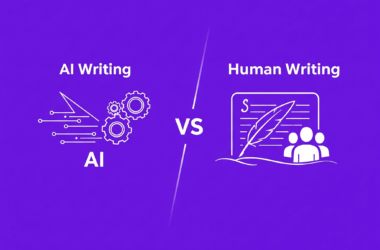Last updated on August 14th, 2023
Google and other search engines are constantly trying new algorithms to enhance the user experience while you search for something. The way they work is pretty simple. They want to eliminate all content that’s low-quality and present high-quality long-form content to their users. They use crawl bots for this purpose.
The bots index, categorize and crawl through the content on your website to understand its relevance with respect to the user’s intent of the search.
While most of us are aware of how critical primary keywords are, we often forget the importance of LSI keywords. Don’t know what exactly are LSI keywords?
What are LSI keywords?
LSI stands for Latent Semantic Indexing. These keywords allow search engines to decode websites/web pages better and hence provide better and more relevant results to a search made. LSI keywords also avoid keyword spamming and keyword stuffing.
The idea behind using LSI keywords is great and beneficial. Whenever a blog is written, we do not tend to “naturally use” keywords redundantly. We structure them and, many times, stuff them.
We “naturally” use a lot of synonyms and keywords related to the topic.
And, LSI takes those synonyms and relevant keywords into account. Search engines use this process by linking related words together and by analyzing how certain keywords appear on web pages in combination with other related keywords or synonyms, or similar concepts.
Because of LSI, smart engines are able to tell that Sania Mirza plays Tennis and Narendra Modi is related to politics and India.
Satish Sen, an SEO expert at Rubique, adds to this by saying, ” Rather than using the same keyword phrase again and again in your content, make content more unnatural and spammy. Adding LSI keywords in content provides more information that makes sense and means more possible searches in the long run”.
Gaurav Sahota, Senior associate of digital Marketing at OnMobile Global Limited, also believes that LSI Keywords determine the thematic relationship between the concept of the web page & content. He says that”Undoubtedly, LSI keywords are key ingredients in the era of semantic SEO.
With recent algorithmic updates like Rankbrain, Google is moving towards Machine Learning & Artificial Intelligence term frequency (TF) & Inverse document frequency (IDF) is no more a game of keyword repetition”.
Here is what Sameer Panjwani, Founder & CEO of Mondovo.com, has to say about LSI keywords
Sameer asserts that including LSI keywords in your SEO campaign is a crucial part of any SEO strategy. He believes that it deals with search relevancy and also is an SEO-friendly tactic. He also adds, that “Today, while you write a great piece of content on your site or your blog, what matters is the context.
With people no longer focusing on a single keyword, it makes sense to include LSI keywords as they help boost the contextuality of your content pieces while also improving your visibility on the search engines – Google and Bing.
For example, when I type “fb picture size” in the Google query box – and click on submit.
I was presented with results that contained the words – social media, images, dimensions etc. These are synonymous with Facebook, picture and size. This means if you’re working on an article that’s related to Facebook picture sizes, make sure to add related terms like social media, images, photos, dimensions etc.
And when someone searches for any of these terms, there’s a high chance of your article popping up on the search engine results page. The period when Google used to consider the number of times a keyword is repeated is long gone.
With every passing day, the search engine landscape is evolving, and Google getting smarter and more relevant.
Therefore, if you use LSI keywords in a natural and SEO-friendly manner, then you’re on your way to success”.
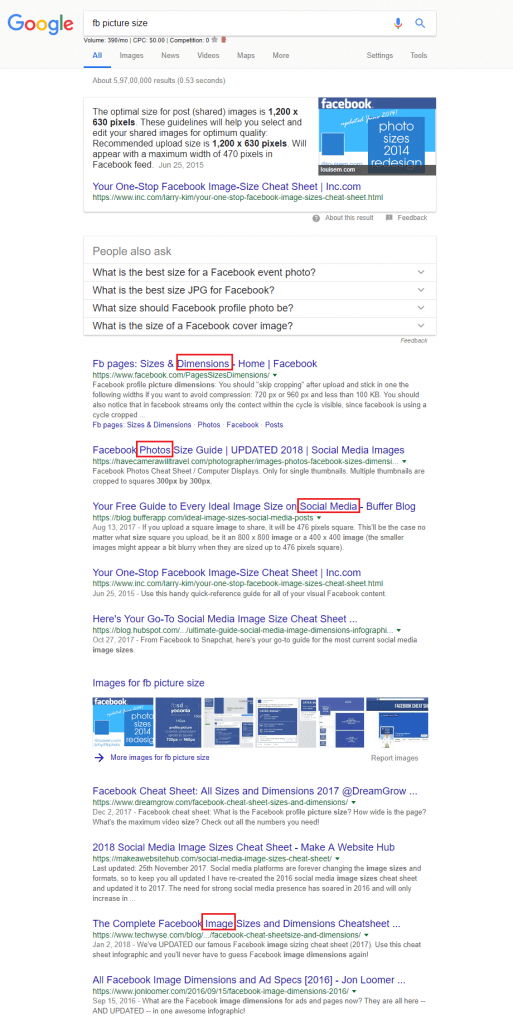
(Follow Mondovo on Facebook, Twitter, Linkedin, Google Plus & Youtube)
Types of LSI keywords?
LSI keywords can be clubbed into two categories; Synonymous LSI(sLSI) Keywords and Related LSI(rLSI).
We will explain both with examples to give you better clarity.
1. rLSI keywords
Relating keywords help Google identify what the content is all about. For example, if you write an article about the keyword Apple, rLSI will help you determine whether you are writing about a fruit or a brand.
If related keywords such as iPhone and Mac OS are found, then Google will semantically index it with the brand Apple and rank it accordingly. However, if keywords such as Pie, Recipes, or Juice are found, Google will know it’s referring to the fruit. There are two services such as InboundWriter and lsikeywords.com, with fantastic algorithms that will return a high-quality list.
Another method to identify these keywords is to do a search on Google. At the bottom of your search page, you can easily see suggested searches. These searches would be related to your keyword.
For example, the phrase “best face scrub” gets a variety of new terms associated with it, such as dry skin, blackheads, acne, etc.
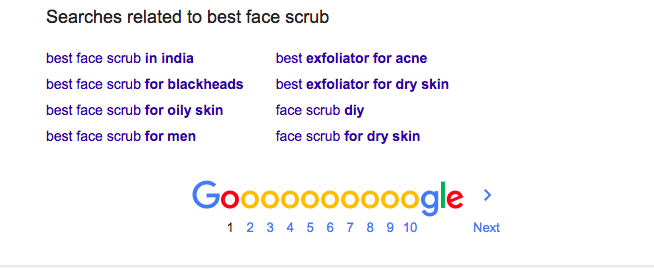
rLSI keywords are helpful as they can diversify your content and broaden its information.
2. sLSI keywords
Google presents the most synonymous word to the search term in order to give the best experience to the user. Here, the search results are impacted on a micro-level, that is, at the keyword level. These keywords are easier to identify and are usually boldened in Google’s search results. For example, top, face, and scrub have been replaced by best, facial, and exfoliate.
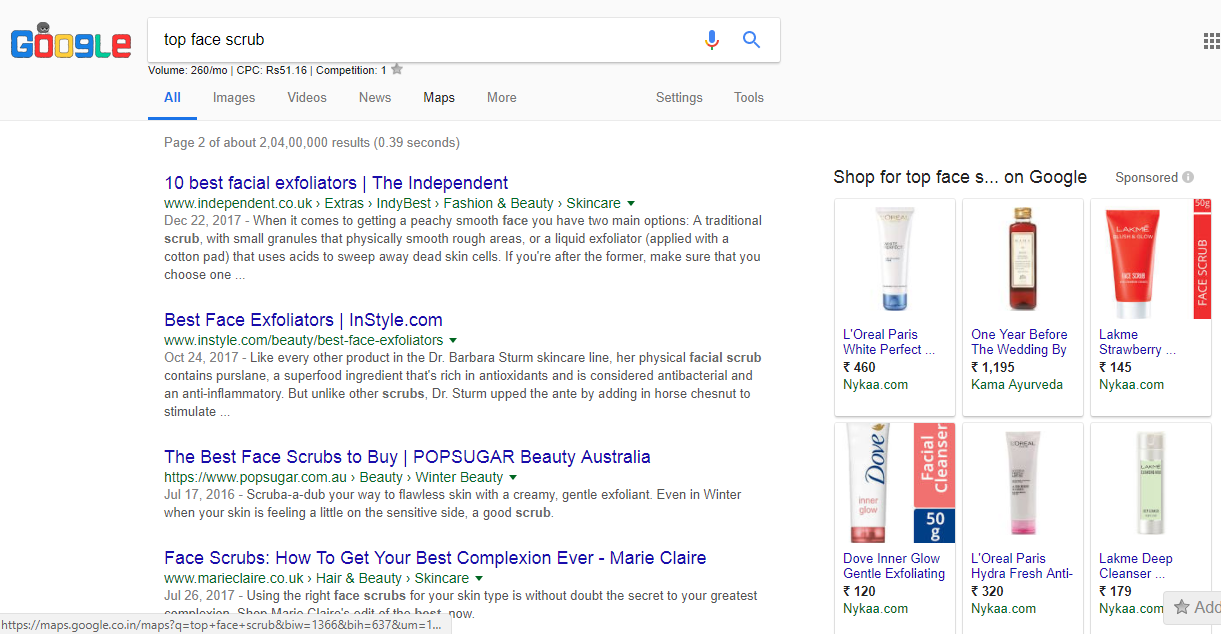
Another way to look at sLSI keywords is to use Google Keyword Planner. You can enter your keyword and switch to negative keywords. Doing this would give you synonymous keywords to your primary keyword.
So, here we have used the keyword cloth and have put a negative keyword filter on. Therefore, we get results such as dresses, diapers, etc, that are synonymous with a cloth.

Are long tail keywords the same as LSI keywords?
There might be similarities between Long tail keywords and LSI keywords, but they are not the same. For any primary keyword, LSI keywords are a mix of long-tail keywords, synonyms, and acronyms.
For example, if our primary keyword is the bag, then your LSI keyword could be “best bag in India” or “best suitcase in Europe”.
So, here the first keyword is a long tail keyword of our primary keyword, bag. However, the second one replaces bag with its synonym, suitcase, and forms a completely different keyword. So, it is safe to say that for a given keyword, its long tail keyword is its LSI keyword, but the reverse does not hold true.
How to use LSI keywords in SEO?
Now there are different ways in which LSI keywords can be incorporated in enhancing SEO. We have listed them all 🙂
Use LSI Keywords in the Meta-Description
The usage of LSI keywords in meta-description is always helpful. Apart from using your main keyword in the meta description, using the LSI keyword should be used, too, as this ensures Google gives you more priority.
This will help you in getting a higher rank. Here is an example that will give you better clarity on this. So, here the keyword is motivational, and its synonym “inspirational” is used in the meta-description.
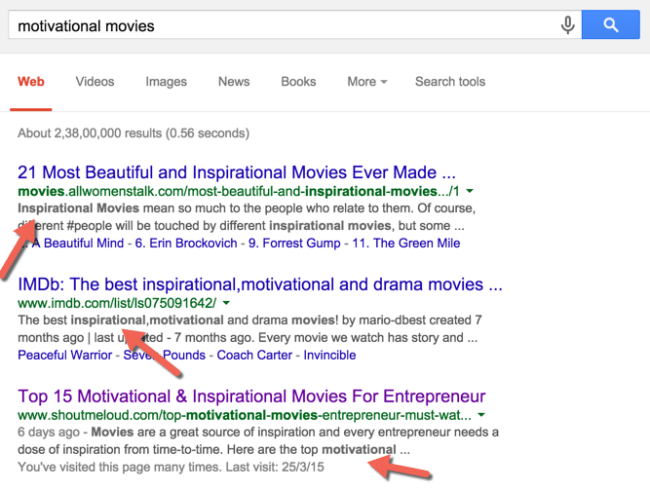
Use the main keyword and two semantic keywords in your Content
LSI Keywords complement the primary keywords, and adding two LSI keywords along with one primary keyword can help you avoid keyword stuffing and, eventually, the Google penalty.
I have an example here from Legal Morning which makes the use case quite clear. Here, the primary keyword used by the author is professional Wikipedia editing, and LSI keywords such as “professional Wikipedia editor” and “get paid to edit Wikipedia.” were incorporated into the content.
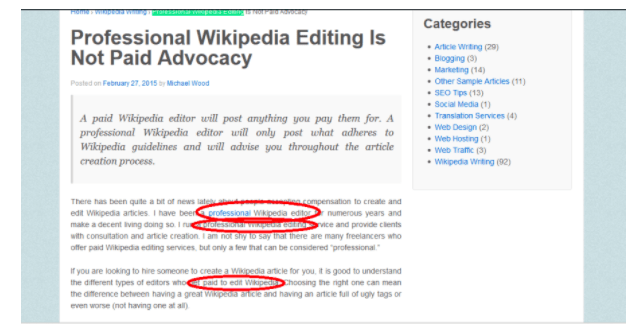
Use LSI keywords in SEM
You can insert LSI keywords in your Pay-Per-Click Campaigns. By choosing LSI keywords along with variations of the main keyword in your ad campaign, your ads will show up more frequently and rank higher. Here is an example of using LSI keywords in an ad.
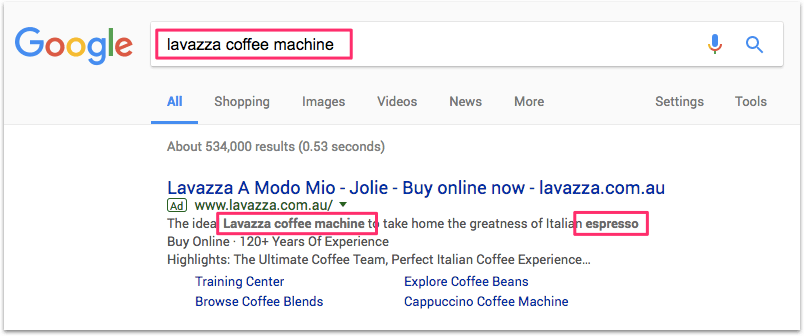
Some other ways of using LSI
You can bring your dead content back. Read below to learn how!
You can use LSI keywords to your main keyword phrase, and through this, you can make your old content alive and make it rank again.
The added LSI keywords will make Google spot and rediscover your content. You should have your old and original keyword phrase in place and add one LSI keyword to it. This will definitely increase the traffic to your website. You can see results sooner than you expect
Another way to use LSI
Optimize your image with LSI Keywords. So, if you have an old image or an image that has been used many times, you can make it live by using the LSI keyword to rename the image each time you use it. This will optimize the image for each piece of content it’s used for.
Word of caution
Make sure that you don’t over-optimize your page with one particular LSI keyword. Overusing an LSI keyword will again put you in the zone of keyword stuffing and might attract a not-so-pleasant Google penalty. So, use one particular LSI keyword once in a page.
How will you find out the LSI keywords:
Here is a LINK to some tools that you can use to find LSI keywords.
Wrapping Up
Success in SEO is a difficult task for content marketers, as the competition is very tough, and new content gets produced every single minute. Using LSI keywords will not only add variety to your content but also greatly improve its ranking and search results.
Along with pumping life into outdated content, LSI keywords make sure that your content is not spammy and it stays far away from Google’s penalty radar. It can improve your blog’s authority and increases the average time spent by users on your website by making the flow smooth.
So, we hope that with this article, you learned what are LSI keywords and can structure a better content strategy by knowing how to use LSI keywords, along with the best white paper practices.
P.S. – “How to use LSI Keywords” is actually an LSI Keyword for my Primary keyword phrase, “What are LSI keywords?” 🙂




